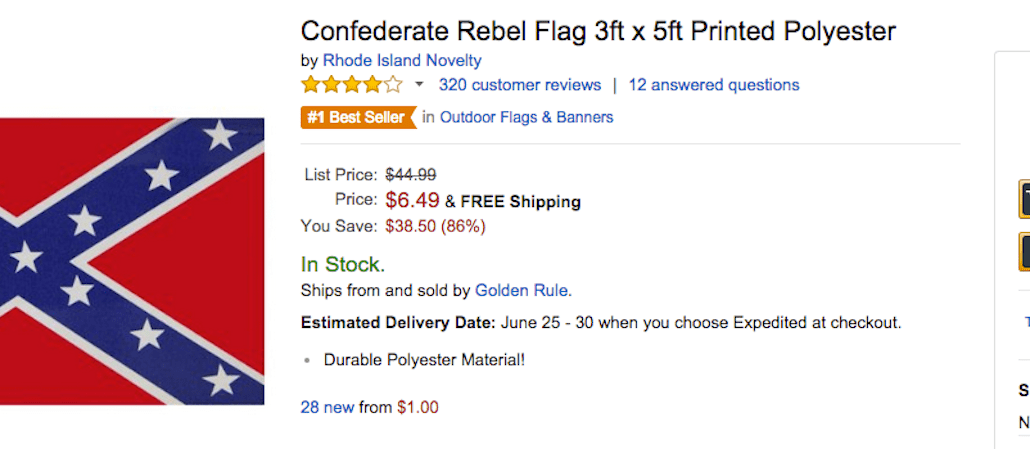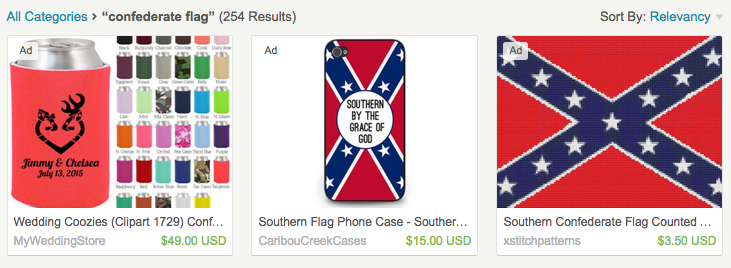
Update: Shortly after this story was published, Amazon and Etsy announced they would join the other retailers in pulling all Confederate merchandise from their sites. This article has been updated throughout to reflect the news.
BREAKING: #Amazon to pull down Confederate flag merchandise from its site
— Reuters Top News (@Reuters) June 23, 2015
South Carolina Governor Nikki Haley called for the confederate flag to be taken down from its post outside of the state Capitol this week, and several retailers that sell merchandise bearing the flag have followed suit.
Walmart, Kmart, Sears and eBay have all announced they will stop selling Confederate merchandise, be it flags or any other item with its image. Amazon followed suit several hours later.
“We never want to offend anyone with the products that we offer,” Walmart spokesman Brian Nick said in a statement. “We have taken steps to remove all items promoting the Confederate flag from our assortment — whether in our stores or on our website.”
Meanwhile, for several hours on Amazon and Etsy, search queries for Confederate flag merchandise continued to turn up thousands of results and items like this one:  The Washington Post editorial board formally called for removal of the Confederate flag at the South Carolina Capitol on Tuesday; Amazon CEO Jeff Bezos owns the Washington Post, but the retailer remained quiet on the matter, despite tweets urging it to pull the products.
The Washington Post editorial board formally called for removal of the Confederate flag at the South Carolina Capitol on Tuesday; Amazon CEO Jeff Bezos owns the Washington Post, but the retailer remained quiet on the matter, despite tweets urging it to pull the products.
Amazon needs to step up ban confederate merchandise #TakeItDown #ConfederateFlag #CharlestonStrong
— Eli On The Rework (@ELITUCKERINC) June 23, 2015
We see you @Amazon, profiting from racial terrorism. Stop profiting from terrorists. Stop selling the #ConfederateFlag. Boycotting til u do.
— Kate Lang (@buckwilde) June 23, 2015
After Walmart and eBay stopped selling the flag and its merchandise, sales for Confederate-branded items in the Patio, Lawn and Garden section on Amazon shot up more than 3000 percent, according to Amazon data. The No. 1 best-seller for the search “Confederate flag” on Amazon was a $1.80 flag, sold by BlockBusterCostumes.
The latest reviews of the best-selling flag consisted of mostly one-star remarks from protesters; the backlash has resulted in some impressive one liners.
Overall, however, 60 percent of the more than 300 reviews of the flag were five-star, positive reviews.

The flag is about to get even harder to find. Roughly 150 million U.S. flags are made every year by American manufacturers. Flag Manufacturers Association of America members plan to get together to discuss continuing to manufacture the Confederate flag, according to USA Today, but in the meantime, prominent flag manufacturer Valley Forge Flag, has announced it plans to stop selling it.
On Etsy, a selling platform for small business owners, Confederate flag-emblazoned items have also been yanked. The number of results that came up after a search for ‘Confederate flag’ dwindled throughout the day, until finally being banned for good. On Twitter earlier on Tuesday, screenshots showed the results neared 1,000 items.
Thanks to the creativity of the open marketplace that Etsy thrives on, the things consumers could buy emblazoned with a Confederate flag were nearly endless, before they began to disappear. Confederate cross stitches, leather bikini tops, printed bottle caps, ashtrays, cornhole boards, salt and pepper shakers, nail art, bow ties and more populated the site.
The marketplace released an official statement Tuesday regarding its decision to pull Confederate items, saying, “Today, we are removing Confederate flag items from our marketplace. Etsy’s policies prohibit items or listings that promote, support or glorify hatred and these items fall squarely into that category.”
Etsy has shown a similar willingness to reform in the past, when it pulled merchandise with the Washington Redskins logo from its marketplace.
More in Marketing

WTF are tokens?
When someone sends a prompt or receives a response, the system breaks language into small segments. These fragments are tokens.

AI is changing how retailers select tech partners
The quick rise of artificial intelligence-powered tools has reshaped retailers’ process of selecting technology partners for anything from marketing to supply chain to merchandising.

YouTube’s upmarket TV push still runs on mid-funnel DNA
YouTube is balancing wanting to be premium TV, the short-form powerhouse and a creator economy engine all at once.








